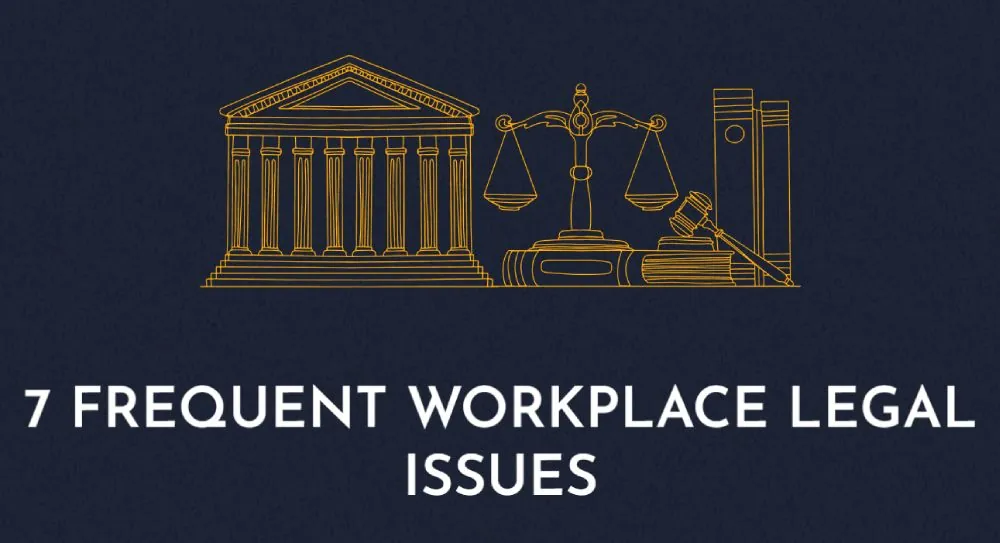
Workplace Legal Issues and Common Safety Concerns
Nobody wants a legal battle with an employer but sometimes it is the only way to receive justice for an unfair employment situation.
A surprising number of employers in Florida fail to understand the local employment issues and workplace legal issues and don’t live up to their obligations towards employees.
These rules exist to maintain a safe and fair environment for everyone and they change frequently as employment law evolves. Disregarding them can lead to legal disputes over common workplace issues that could be avoided.
Understanding the most frequent types of workplace legal issues can help employers avoid problems and employees understand what their legal rights are.
7 Common Legal Issues Employees Face Today in the Workplace
Table of Contents
- Workplace Safety Issues
- Wrongful Termination
- Harassment or Discrimination
- Violation of Privacy Laws
- Overtime Pay Issues
- Employment Status Issues
- Illegal Labor
1. Common Workplace Problems and Safety Issues
One of the most common workplace problems and legal issues in the workplace involves safety rules. While safety hazards in offices may be minimal, there are still basic safety standards for employers to follow. Trip and fall accidents are among the most common causes of injuries.
Safety becomes even more important in potentially dangerous factory environments or where items like hazardous chemicals are handled. Employers have a duty to provide proper protective equipment and procedures that minimize the risk of injuries or they can be held liable for negligence.
2. Potential Legal Issues: Wrongful Termination and Employment Concerns
Terminating an employee for no reason (without cause) is permitted under certain circumstances in Florida, which is an “at-will” state.
However, if you were fired without correct notification or due to discriminatory practices (such as for being too old, the wrong gender or sexual orientation) or as retaliation for making a complaint against your employer, you might be facing serious employment issues that could require legal action. You may have grounds for a lawsuit. A variety of federal and state laws cover this topic.
3. Harassment, Discrimination, and Other Legal Concerns in the Workplace
Harassment and discrimination in the workplace are common causes of legal concerns between employers and employees. Again, both federal and state laws may come into play here.
Federal laws expressly forbid discrimination based on national or ethnic origin, sex, age, religion, disability, gender preference or retaliation. The discrimination does not need to be clear and obvious to everyone—simply treating one employee differently from others can lead to claims of discrimination against an employer.
Harassment claims are also common, especially relating to sexual harassment and intimidation. Company policies that govern how these topics are treated in the workplace need to be made clear, and guidelines should be provided for if employees witness errant behavior.
4. Violation of Privacy Laws: Legal and Ethical Issues in the Workplace
If an employer uses an employee’s name or photo in advertisements, secretly records conversations or uses images in a promotion without permission, it may be a violation of that employee’s privacy rights.
An employer does not “own” an employee and so using their identity for commercial gain is unlawful, creating potential legal issues in the workplace related to privacy.
5. Overtime Pay Issues and Other Common Workplace Legal Concerns
Overtime pay can be a “hot potato” labor law issue between employees and employers.
Much of the confusion stems from the regularly changing laws and the fact that many employees and employers in certain industries do not know the working hour limit in any given week – nor how many they actually work.
The Fair Labor Standards Act states that employees must receive at least time and one-half of their regular pay rate for all hours worked over 40 in a workweek. This, however, does not apply to exempt employees and Florida state law makes additional provisions that you should familiarize yourself with.
6. Employment Status Issues and Workplace Legal Concerns
What classifies you as an employee?
Some employers hire contractors, interns, and others who they may not consider to be “employees” and who they believe, therefore, are not covered by state and federal employment laws. However, if a “contractor” performs their role like an employee and a separate contract does not specifically state otherwise, they may still be covered by employment laws.
Likewise, if an intern does the job of a permanent employee, he or she may be legally considered a regular employee and should be paid like one.
7. Illegal Labor Practices and Employment Law Issues in the Workplace
Hiring someone who is not legally able to work in the U.S. is a serious offense and one that can have employers investigated by federal or state agencies.
Employers must do background checks to ensure that potential employees have the correct documentation (green card) that proves their legal right to work in the U.S. before signing any employment contracts. Immigration audits can and do happen.
As well as employing adults who can work legally, it is also important for employers to follow the child labor laws in the U.S. or potentially face legal action.
[trustindex no-registration=google]
Need to File an EEOC Complaint? Consult an Experienced Employment Lawyer Today
If you have been the victim of discrimination or retaliation by an employer, the Equal Employment Opportunity Commission (EEOC) can handle your complaint.
The EEOC is a federal body and only handles discrimination and retaliation claims. It does not deal with wage disputes.
You can submit the claim in person at your local EEOC office or by mail or online. To do so, you do not need to have quit your job or been dismissed. Many employees get this wrong and mistakenly wait until they leave to file a complaint.
You will need to submit documentation to back up your discrimination claim, such as emails, recordings, and/or letters. Your employer may hire lawyers to defend the claim so you may want to consider legal advice or representation from an employment attorney to protect your rights.
After you file your employment claim, don’t expect a quick response. The EEOC takes its time and a mediator may be appointed so that the matter can be settled out of court if possible. Again, by hiring an employment attorney, you can ensure that your best interests are looked after during this process.
With all workplace legal issues, it is important to understand your rights. If you suspect that you have been treated unfairly, start gathering evidence and speak to an employment attorney. For assistance with any employment law matter, speak to a knowledgeable and experienced employment lawyer at Brenton Legal in Florida. Contact us today.

